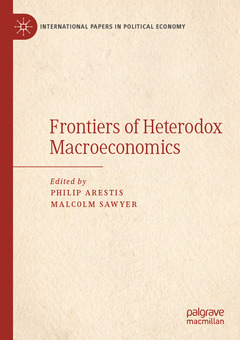Description
Frontiers of Heterodox Macroeconomics, 1st ed. 2019
International Papers in Political Economy Series
Language: English
Subjects for Frontiers of Heterodox Macroeconomics:
Keywords
Ecological macroeconomics; Income distribution; New macroeconomic models; Fiscal policy; Monetary policy; New Consensus Macroeconomics; Future Macroeconomic and Regulatory Policy; Post Keynesian Analysis of Money and Finance; SFC Dynamic Models; Secular stagnation; Inflation; Budget deficits; Socially responsible economics; Keynesian macroeconomics
Publication date: 09-2020
Support: Print on demand
Publication date: 09-2019
Support: Print on demand
Description
/li>Contents
/li>Biography
/li>Comment
/li>
In the past few decades, and intensified since the global financial crisis of August 2007, heterodox macroeconomics has developed apace and its scope has broadened in a number of directions. The purpose of this volume is to review the ?state of the art? in heterodox macroeconomics, its strengths and weaknesses and future directions. Heterodox macroeconomics has broadened its scope through gender macroeconomics, ecological macroeconomics and further incorporated income distribution and inequality into macroeconomics analysis. New macroeconomic models, particularly stock-flow consistent modelling has become a widely used mode of analysis. Money and finance, monetary policy and fiscal policy as well as other policies have been discussed widely. The focus of this edited collection is on all of these issues, with chapters focusing on inflation, ecological sustainability and regulatory policy.
Explores the development of sub-disciplines within heterodox economics whilst maintaining the focus on macroeconomics
Considers how Hetrodox Economics has changed in a Post-Crash environment
Brings together a range of highly respected contributors
These books may interest you

Macroeconomics For Dummies - UK 24.87 €

Handbook of Macroeconomics 259.76 €


